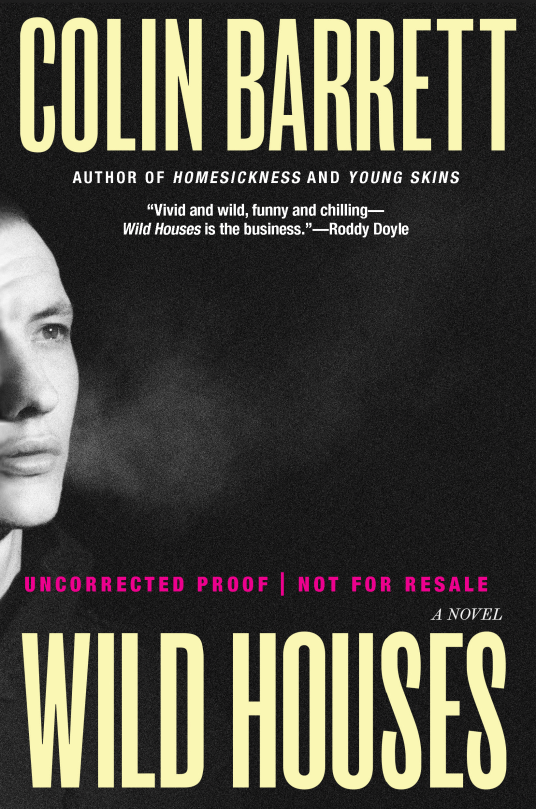Susan Griffin - 'Out of Silence, Sound. Out of Nothing, Something - A Writer's Guide'
A brilliant little book that packs a lot of humanistic and powerful advice for all writers.

And though he had since reacquainted himself with certain habits – Gabe took a drink, took a smoke, and would take a hit of a joint if a joint was going – he still considered himself clean because he was off the heroin, and if that distinction was sufficient to meet the man’s definition of clean, well, fair enough so, was Dev’s opinion.
While the book might have become another Trainspotting, Barrett travels beyond superficiality and instead goes for gold by capturing what goes on in the stories. Irvine Welsh’s highly contagious writing, seemingly inspired by Martin Amis, William S. Burroughs, and Hunter S. Thompson, has affected many young writers. Colin Barrett is not one of those.
This book describes the lives of a few young persons in Ireland. Short sentences seem to betray what aren’t mundane existences; there’s no calling out of morals, no shock tactics à la Bret Easton Ellis.
He let the dog out the back door. The rain had stopped. The night air had that clean, stony smell it got after rain. Georgie trotted down the garden and Dev followed. The garden was big and empty, bordered by a concrete wall, invisible now in the dark. Dev trudged a good ways out into the grass. There was no dark like country dark, the blackness beyond the house so total that looking out across the back fields he could not tell where the earth ended and the sky began. All was void. At the bottom of the garden he turned back and faced the house. The lone burning rectangle of the kitchen window cast an apron of illumination a little way out onto the grass, but Dev was stood well beyond the reach of its glow. He took out his prick. He could hear Georgie nearby, truffling in the grass, divining his own spot in which to urinate. As he pissed, he tilted his head all the way back and looked straight up. There, in the farthest, purest reaches of the sky, the stars grew in distinctness and brightness until it felt like he could reach out and touch the cold phosphorescent centres of them. The arc of his warm stream wavered and guttered out. He shook himself off and zipped up.
At first, I felt as though the book would not carry through. Barrett, a very accomplished writer, has previously released short-story collections and here debuts with his first novel. To transition from short stories to the big picture is hard with all the immediate benefits one gets from writing short stories. Has Barrett, then, managed to write something different than one big selection of short stories that are tangled together?
The people in this book aren’t two-dimensional, but they way they’re written makes a lot of other books by other writers seem flat. There’s enough subterfuge in Barrett’s writing to both satisfy the hyperkinetic reader who wants easy payoff and the one not looking for simple kicks.
For me, getting into Barrett’s style of writing always requires time and patience: it takes me, who usually reads biographies, politics, philosophy, music, and essays, a bit of leeway, after which everything’s worth the effort. It’s like trying to keep pace with a slightly erratic swimmer.
And, to answer my own question, does Barrett, then, work out the kinks required to write a holistically functioning novel? Well, yes and barely: while Barrett’s writing style, in general, is nearly always very good in short breaths, the novel form is something into which he will likely grow. Some passages, for example, a brilliant one that takes in a pub, is an impressive piece of writing. However, it is fitted between passages that altogether make the book feel slightly…IKEA. Pieces have been picked because they’re beautiful, perhaps not for their ability to fit together. That will surely come in the next book.
The main characters are both running and run-down, perhaps victims of ourselves, victims of capitalism, or…one thing this book did, was get me thinking about human conditions and how we end up in some of our situations in life, both the mundane and the extraordinary. Barrett isn’t really a show-off and, paired with his raconteur abilities, that’s how he rolls; think José Saramago meets William S. Burroughs.
Is this book worth reading? Absolutely.
In spite of a few telltale signs of a neophyte novelist, there’s enough far-reaching and deeply humanistic writing here to not only last throughout the book, but also to keep me waiting for Barrett’s next novel.
